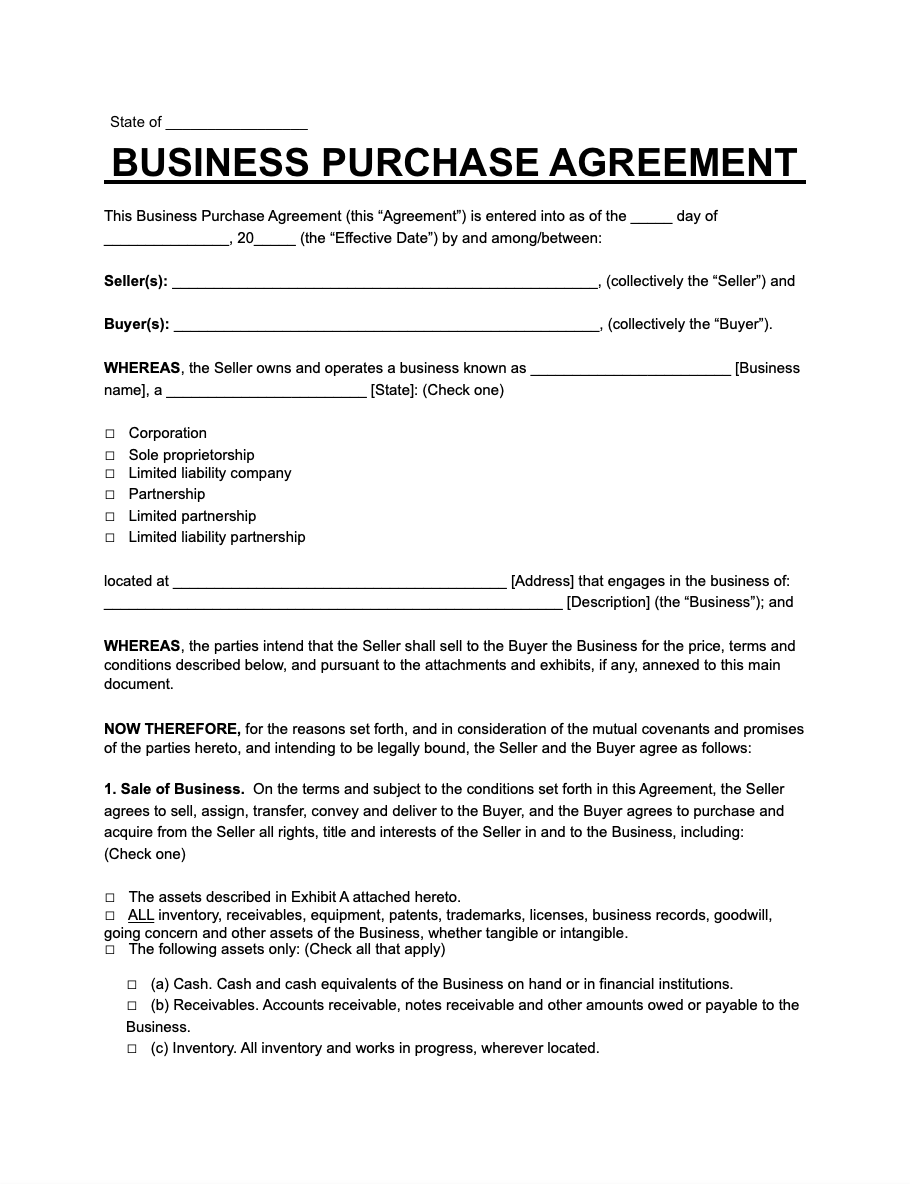Free Business Purchase Agreement
Use our free Business Purchase Agreement to document the transfer of ownership for a business.
Create Document-
1
Choose a form
Browse and select the document you need
-
2
Answer Questions
Go through our builder and complete your form in 5 minutes
-
3
Download & E-sign
Receive your document in PDF or Word format
 Create Document
Create Document
- Download as PDF and Word
- Access from desktop, tablet & mobile
- E-signature
- Yearly Updates & Notifications
A business purchase agreement, also called a purchase agreement or a transfer agreement, is a contract that transfers ownership of an existing business or corporate entity to a new purchaser. This document protects the seller and the purchaser by outlining everything the parties have agreed upon.
The business purchase agreement describes the details of the sale and explains all aspects of the transfer, which can include physical assets, intellectual property, trade names, customer list, and others.
What Is a Business Purchase Agreement?
A business purchase agreement is a contract transferring rights and ownership of a business from the current owner to the purchaser.
This is a legally binding document that lays out the agreed-upon terms, including restrictive clauses, noncompetition agreements, assumption of liabilities, and other terms to which the parties have agreed.
Why Do You Need a Business Purchase Agreement?
The business purchase agreement details everything the parties have agreed upon for the transfer of the business. Anything that needs to be explained and defined for the transfer must be described in the contract.
A business usually has long-term agreements with other companies. The buyer will take over these agreements, called the assumption of liabilities. The buyer also buys at least some of the business’s current assets, such as the building, fixtures, and inventory. The value of these assets needs to be outlined in the agreement.
When Do You Use a Business Purchase Agreement?
The business purchase agreement is written and agreed upon before the sale date. Both parties should have the agreement reviewed by their legal representatives so that everyone agrees to the terms and conditions in the agreement. The agreement becomes final when all parties sign it.
Before drafting a business purchase agreement, buyers usually submit a letter of intent to the seller.
This is another legal document that outlines the terms of the purchase agreement, including the purchase price, due diligence terms, and so on. As soon as the letter of intent is signed, the legally binding transaction can begin.
Other legal documents that can accompany a business purchase agreement are bill of sale, service agreements, or trademark assignment agreements.
What to Include in a Business Purchase Agreement
Whether you write your business purchase agreement or use a free purchase agreement template online, there are things you want to have listed in your purchase agreement.
A detailed business purchase agreement can protect both the seller and the buyer once the ownership transfer is finalized.
- Assumed Liabilities. If the business already has any outstanding contracts, bills, loans, accounts payable or receivable, pending legal actions, or other liabilities, the purchase agreement should state the buyer assumes these liabilities in full.
- Sale of Assets. If the buyer is purchasing all the business assets, such as inventory and fixtures, the agreement should provide the value of the assets. The buyer agrees to purchase these assets.
- Lease agreement. If the buyer needs to assume the lease on the building, the business purchase agreement may require an addendum that references the new lease.
- Restrictive clauses. Any restrictions the parties have agreed upon, such as nondisclosure or noncompetition agreements, non-solicitation clauses, and so on, should be specified.
- Date of closing. As with any sale agreement, the contract should have a delivery date.
Frequently Asked Questions
What happens if I don’t have a business purchase agreement?
If there are disagreements later about the sale of the business, a written contract clearly shows what the terms and conditions of the sale were supposed to be. Without a written record that both parties agree upon, there is no proof of what the buyer and seller intended.
Do I need an attorney for a business purchase agreement?
You can write your agreement using a business purchase agreement template, but it is recommended that you have an attorney review the legal contract before you sign it.
How to Write a Business Purchase Agreement
Business purchase agreements can be complex, but an agreement template can come in handy to speed up and simplify the process.
Templates contain boilerplate language about the general terms and conditions that the buyer and seller should have in mind, such as warranties and representations and dispute resolution.
If you want to write your own, you can still follow the same steps.
- Names of the seller and buyer go first. Include the name and type of business entity, business address, structure, and target market.
- Itemize the business assets at fair market value, including anything not being sold. This list can be a separate page if you prefer, where you list the physical assets (equipment, real estate, vehicles), financial assets (accounts receivable, financial statements), and intangible assets (business name, trademarks).
- List the business’s liabilities, including any liabilities being excluded. You can specify tax liabilities, loans, salaries, third-party fees, or other liabilities.
- Specify the purchase price. If the payments are being made in installments, you should explain how they are made and the dates and method of installment payments.
- Include terms and conditions. This is where downloading boilerplate language is useful.
- Closing date. This should be when the buyer will pay, and the seller will hand in the assets.
- Signatures. Both buyer and seller must sign and date the business purchase agreement, and having it notarized is usually advised.
